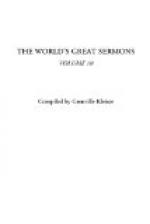’Tis very vain of me to boast
How small a price this Bible cost;
The day of judgment will make clear
’Twas very cheap or very dear.
Shall we go forward with our Bible or backward without it? Infidelity has always forgotten that, so far as it has an eye for liberty and humanity, the Christianity not of sects but of the Bible has furnished it and trained it. The liberalism which puts its Bible aside will acknowledge that a Christless humanity culminated in Rome. Skepticism is often eloquent when it tries to show how much “fragments of Roman art” had to do with the making of modern civilization. Now, as Rome marks the height to which humanity without a Bible ascended, it would seem that this would be just the point where free and untrammeled thought and the fullest intellectual liberty would be found. Right there, where a Christless race was supreme, ought to be the place where the liberty abounded which the religion of Christ is said to destroy.
Whose program for the production of intellectual and spiritual liberty can liberals accept? Hoarse is the cry: The Bible is to be cast out. We look and behold men who have these opinions sitting on the throne of the Caesars. Now, one would suppose the intellect of that whole realm would have fair play. There was no Bible there to fetter or to annoy. This ought to be the halcyon age for “the liberty of man, woman and child.” These rulers have the same dignified abhorrence for all kinds of religion. The skeptic Lucretius says: “The fear of the lower world must be sent headlong forth. It poisons life to its lowest depths; it spreads over all things the blackness of death; it leaves no pleasure unalloyed.” I match the Roman with the phrase of a recent orator of this school who spoke of the soldiers dead, as now “sleeping beneath the shadows of the clouds, careless alike of sunshine or of storm, each in the windowless palace of rest.” There was no window in the grave when more illustrious and original skeptics talked about it. Modern infidelity has many expressions on the future after death which sound like the old Roman distich, “I was not, and became; I was, and am no more.”
Its orator, bending over the body of his dear brother, said nothing more touching than did Tacitus over the grave of Agricola, as he wrote: “If there is a place for the spirits of the pious; if, as the wise suppose, great souls do not become extinct with their bodies; if”—oh, that age of “if” ought to have been an age when every brain was free and no thought or sentiment were a chain. The Bible of Christianity was not powerful enough to throttle anybody. Its pages were not all written; its authors were hunted and outcast. Morals, too, ought to have been all right, for we are told that they are independent of God and Christ.




